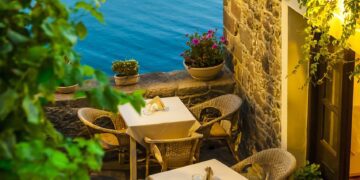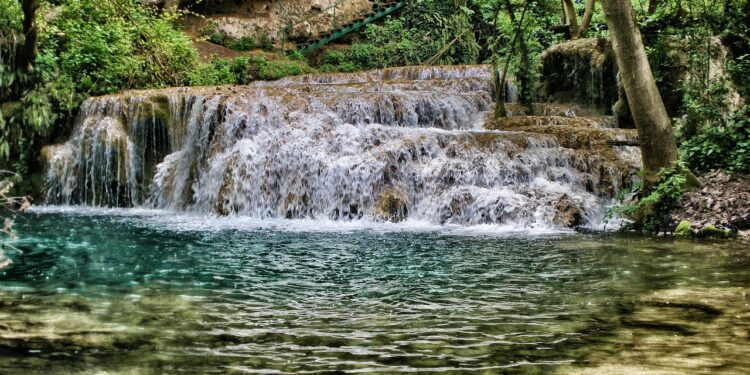When we first decided to visit Bulgaria, we had no idea we were about to uncover one of Europe’s best-kept secrets. This beautiful country surprised us with its rich history, stunning landscapes, and warm hospitality. From the vibrant streets of Sofia to the serene beaches of the Black Sea, Bulgaria captivated us at every turn. There’s a lot to do here, whether you love history, enjoy hiking adventures, or just want to relax by the seaside. Our Bulgaria Travel Guide can save you money and help you make the most of your trip.
Nestled in Southeast Europe, Bulgaria sits proudly in the heart of the Balkans. It’s bordered by Romania to the north, Serbia and North Macedonia to the west, Greece and Turkey to the south, and the Black Sea to the east. This strategic location has made Bulgaria a cultural crossroads for centuries, blending Eastern and Western influences into a unique and fascinating tapestry. Its landscape ranges from majestic mountain ranges to fertile plains and picturesque coastlines.
Top Things to Do in Bulgaria
Is Bulgaria a Good Holiday Destination?
Bulgaria has a lot to offer, making it a great holiday spot. Explore historic sites like Plovdiv or Nessebar, or enjoy the diverse landscapes—from the Rila and Pirin mountains to the Black Sea coast.
Explore Sofia’s Hidden Gems
We started our vacay in Sofia, Bulgaria’s bustling capital. The city is a delightful mix of old-world charm and modern energy, with an abundance of historical landmarks and vibrant street life. Here are some must-see highlights:
- Alexander Nevsky Cathedral: One of the largest Orthodox cathedrals in the world, this architectural marvel with stunning golden domes is a symbol of Sofia. Entry is free, but donations are appreciated.
- Vitosha Boulevard: This lively pedestrian street is perfect for shopping, people-watching, or grabbing a coffee at a sidewalk café. Here, you can find a mix of local boutiques, high-street brands, and charming eateries.
- Boyana Church: A UNESCO World Heritage site, Boyana Church is renowned for its beautifully preserved medieval frescoes dating back to the 13th century. Entrance is around £5 (£10 BGN), but it’s well worth it for art and history lovers.
- National Palace of Culture (NDK): This massive cultural complex hosts concerts, exhibitions, and festivals. Take a leisurely walk through the surrounding gardens and enjoy the fountains.
Wander Through Plovdiv’s Old Town
Next, we headed to Plovdiv, one of the oldest continuously inhabited cities in Europe. Plovdiv’s Old Town is a fascinating blend of ancient history and modern culture:

- Ancient Roman Theatre: This remarkably well-preserved Roman amphitheatre is still used for performances today. Tickets for events are typically between £8-15 (£16-30 BGN).
- Colourful Revival Houses: Plovdiv’s Old Town is a maze of cobblestone streets lined with beautifully restored houses from Bulgaria’s National Revival period, each with its unique charm. Most of these houses are now museums, with entry prices ranging from £2-4 (£4-8 BGN).
- Kapana Creative District: Known as “The Trap,” Kapana is a lively area filled with cafes, street art, artisan shops, and galleries. It’s the perfect spot to relax and soak in the creative vibe of Plovdiv.
Relax on the Black Sea Coast
We fell in love with the sunny beaches of the Black Sea, where we spent a few days enjoying both lively and quieter coastal spots.
- Sunny Beach: This is Bulgaria’s most popular beach resort, known for its vibrant nightlife and endless activities. If you’re looking for lively bars, water sports, and nightclubs, Sunny Beach has it all. Expect to pay around £5-7 (£10-14 BGN) for a sunbed and umbrella rental.
- Balchik: We also visited Balchik, a coastal town known for its beautiful botanical garden and the Balchik Palace, once the summer residence of the Romanian Queen. Balchik has a laid-back vibe, great views, and a mix of history and nature, making it a fun and affordable place to explore. Entry to the botanical garden and palace is around £4-5 (£8-10 BGN), and dining here is cheaper compared to bigger tourist spots.
- Nessebar: Just south of Sunny Beach, Nessebar is a UNESCO-listed ancient town that offers a more relaxed vibe. Wander through its cobbled streets and discover charming churches, seaside restaurants, and artisan shops.
- Sozopol: A quieter, more historic seaside town, Sozopol is ideal if you’re looking for a slower pace. Stroll along the narrow streets, enjoy fresh seafood, and soak up the beautiful views of the coastline. Meals in Sozopol typically cost between £10-15 (£20-30 BGN) per person.
Hike in the Rila Mountains
For nature lovers, the Rila Mountains offer some of Bulgaria’s most breathtaking scenery. We embarked on a few memorable hikes here:
- Rila Monastery: A spiritual haven nestled deep in the mountains, Rila Monastery is a must-visit. The monastery complex is free to enter, but donations are encouraged, and there’s a small museum fee of about £2 (£4 BGN).
- Seven Rila Lakes: This famous hiking destination offers stunning views of a chain of glacial lakes. The hike itself is moderate, and you can take a chairlift to get closer to the lakes for about £8 (£16 BGN) round trip.
Is Bulgaria Safe?
Absolutely! We found Bulgaria to be welcoming and safe, and we experienced no issues during our travels. Here are a few tips to make your trip even more enjoyable:
- Stay Aware: Like in any country, be mindful of your belongings in crowded areas to avoid pickpocketing. Stick to well-lit areas at night, especially in unfamiliar places.
- Emergency Numbers: Bulgaria’s general emergency number is 112, which covers all emergency services, including police, ambulance, and fire.
- Local Etiquette: A little courtesy goes a long way. Bulgarians value politeness, so learning a few basic phrases in Bulgarian, like “thank you” (“blagodarya”) and “hello” (“zdravei”), can be very helpful.
Travel Costs and Suggested Budgets for a Holiday in Bulgaria
One of the best things about Bulgaria is its affordability. Whether you’re a budget traveller or looking for a bit more comfort, here’s what you can expect:
- Budget Tourists (£25-40/day):
- Hostel dorm bed: £10-12 (£20-24 BGN)
- Street food and groceries: £4-8 (£8-16 BGN)
- Public transportation: £2-3 (£4-6 BGN)
- Mid-Range Tourists (£40-80/day):
- Private hostel room or budget hotel: £20-40 (£40-80 BGN)
- Dining out: £10-20 (£20-40 BGN)
- Activities and local transport: £10-15 (£20-30 BGN)
- Luxury Tourists (£80+/day):
- High-end hotels: £80+ (£160+ BGN)
- Fine dining: £20+ (£40+ BGN) per meal
- Private tours and car rentals: £40+ (£80+ BGN)
Where to Stay in Bulgaria
Sofia
- Budget: Hostel Mostel – Dorm beds from £12 (£24 BGN) per night. Includes breakfast and a light dinner.
- Mid-Range: Hotel Lion – Comfortable rooms from £40 (£80 BGN) per night. Great location near key sights.
- Luxury: Grand Hotel Sofia – Spacious rooms from £100 (£200 BGN) per night. Excellent amenities and centrally located.
Plovdiv
- Budget: Hikers Hostel – Dorm beds from £10 (£20 BGN) per night, with a friendly atmosphere and good city views.
- Mid-Range: Family Hotel at Renaissance Square – Rooms from £35 (£70 BGN) per night. Charming hotel in the heart of the Old Town.
- Luxury: Hotel Ego – Rooms from £55 (£110 BGN) per night. Modern, comfortable, and centrally located.
Varna (Black Sea Coast)
- Budget: Yo Ho Hostel – Dorm beds from £9 (£18 BGN) per night. Great location near the beach and city centre.
- Mid-Range: Hotel Diva – Rooms from £30 (£60 BGN) per night. Clean and comfortable with easy beach access.
- Luxury: Graffit Gallery Hotel – Rooms from £80 (£160 BGN) per night. Artistic design and excellent facilities.
What to Eat in Bulgaria
Bulgarian cuisine is a delightful discovery for anyone who loves hearty, flavourful dishes. Here are some of our favourite foods to try during your visit:
- Banitsa: A savoury pastry made with layers of filo dough and filled with cheese and eggs. Perfect for breakfast and costs around £1-1.50 (£2-3 BGN) from a bakery.
- Shopska Salad: A refreshing mix of tomatoes, cucumbers, peppers, onions, and sirene cheese, topped with sunflower oil and parsley. Prices range from £2-3 (£4-6 BGN) in restaurants.
- Kebapche: Grilled minced meat seasoned with spices, similar to a sausage. Often served with a side of chips, it’s a popular dish found at traditional restaurants for around £3-4 (£6-8 BGN).
- Tarator: A cold yogurt soup made with cucumber, garlic, dill, and walnuts. It’s especially refreshing during the summer and costs about £1.50-2 (£3-4 BGN).
We enjoyed hearty meals at local restaurants for around £10-12 (£20-25 BGN) per person, while street food and bakeries offered tasty options for under £4 (£8 BGN).
How to Get Around Bulgaria
- Public Transport: Buses, trams, and trolleybuses are available in all major cities and are very affordable. A single ticket costs about £0.70 (£1.40 BGN). You can also get day passes for unlimited travel for around £2 (£4 BGN).
- Taxis: Taxis are relatively cheap, but make sure to use reputable companies. Prices start at £0.40 (£0.80 BGN) per kilometre, and a typical ride within the city costs around £4-5 (£8-10 BGN). Always ensure the meter is running.
- Car Rental: Renting a car is a great option if you want the freedom to explore rural areas and less accessible sights. Rentals start at around £20 (£40 BGN) per day, plus fuel.
- Domestic Flights: Although not as common, there are domestic flights between Sofia, Varna, and Burgas. Prices range from £35-60 (£70-120 BGN) depending on the season and how far in advance you book.
Tips for Saving Money in Bulgaria
- Use Public Transport: It’s cheap, reliable, and covers most of the cities. For intercity travel, buses are often more affordable and faster than trains.
- Eat Local: Head to local eateries and bakeries for delicious, budget-friendly meals. Street food like banitsa or kebapche is both tasty and inexpensive.
- Visit Free Attractions: Many churches, parks, and historic sites are free to enter. Walking tours in Sofia and Plovdiv are also available on a “pay-what-you-want” basis.
- Travel Off-Peak: If you visit Bulgaria during the shoulder seasons (April-May or September-October), you’ll find lower accommodation prices and fewer tourists.
Best Time to Visit Bulgaria
- Spring (April-May): The Bulgaria weather May is delightfully mild, with blossoming nature and longer sunny days, providing an inviting backdrop for outdoor adventures and exploring the country’s scenic beauty. Temperatures range from 10-20°C (50-68°F), ideal for exploring cities and countryside.
- Summer (June-August): With temperatures between 25-35°C (77-95°F), summer is perfect for the Black Sea coast. However, popular spots like Sunny Beach can get crowded and pricier.
- Autumn (September-October): Autumn brings pleasant temperatures (15-25°C or 59-77°F) and beautiful fall foliage. The pleasant Bulgaria weather September sets a perfect stage for exploring the outdoors, be it hiking in the mountains, strolling through the cities, or enjoying the less crowded beaches
- Winter (November-March): Winter is cold, with temperatures dropping below freezing, especially in the mountains. Ski resorts like Bansko, Borovets, and Pamporovo are popular for winter sports enthusiasts.
Time Difference Between UK and Bulgaria
Bulgaria is two hours ahead of the UK, which makes adjusting easy. This small difference helps avoid major jet lag and keeps communication with home simple if you’re on a working holiday.
How Long Does It Take to Get to Bulgaria?
Flights from the UK to Bulgaria are short, taking about 3 hours. You can fly directly to Sofia, Varna, or Burgas, giving you multiple options to start exploring.
Bulgaria Airports
Bulgaria has several airports, including Sofia, Varna, and Burgas, which make it easy to reach different parts of the country and explore its attractions.
Shopping in Bulgaria
Shopping in Bulgaria is a unique experience, offering local crafts, rose oil products, and fresh produce. It’s a great way to discover Bulgaria’s vibrant culture.
Bulgaria Travel Plug
Bulgaria uses the type F plug with two round pins, so UK travellers need an adapter. It’s best to buy a universal adapter before your trip.
Bulgarian Drinking Age
The legal drinking age in Bulgaria is 18. Bulgaria has a rich winemaking history, and there are many traditional spirits like rakia to try responsibly.
Bulgaria surprised us in the best possible way. Whether you’re a history buff, nature enthusiast, or beach lover, this country has something to offer. From exploring ancient towns and hiking scenic mountains to enjoying hearty local cuisine, Bulgaria is a destination that deserves a spot on your travel list. We can’t wait to go back and explore even more!














